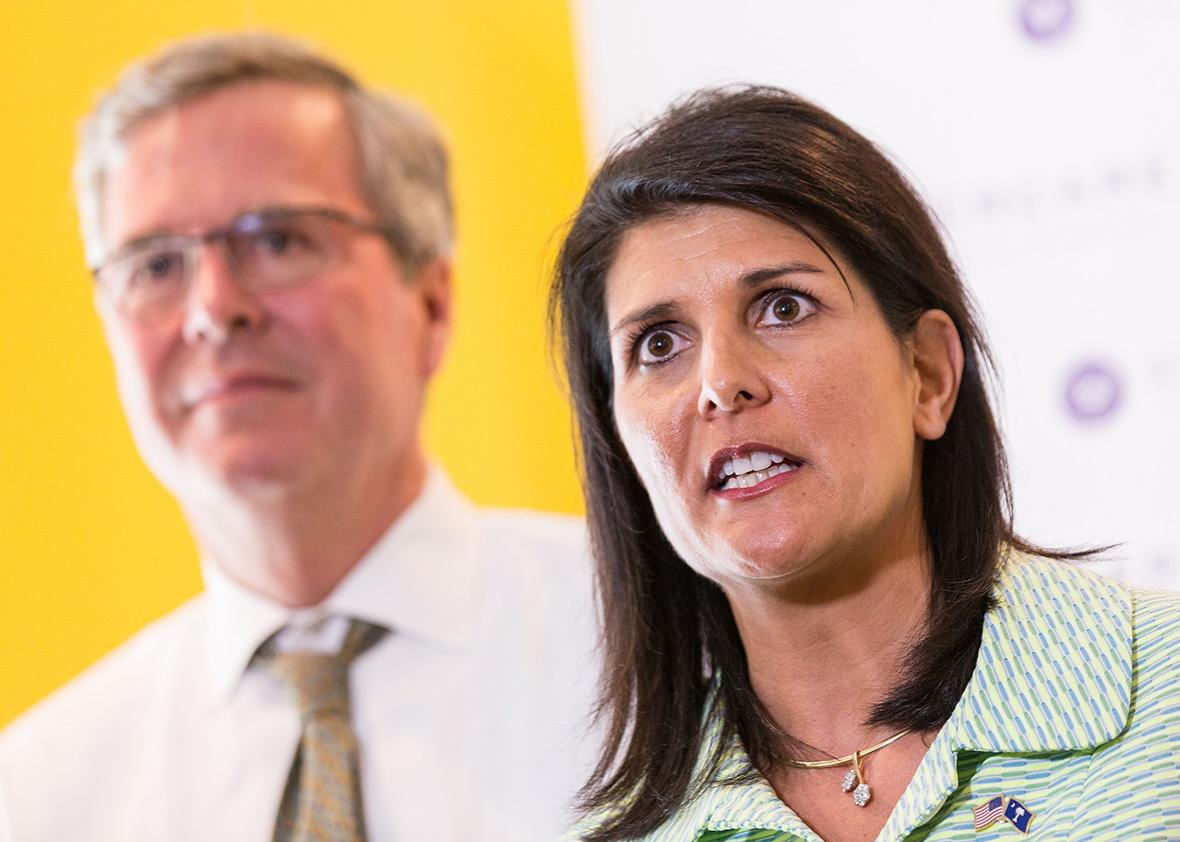The entirety of American political journalism right now is working diligently to ask every single Republican politician, operative, interest group, and commentator in the country the same question: Do you support Donald Trump?
For those faced with the question, it’s a tricky risk calculus to work through, and the responses are … complex, let’s say. Sure, there are the “Never Trump” conservative writers and pundits flatly rejecting the presumptive nominee and cosplaying the French Resistance in their offices. But in the scheme of things they amount to a sideshow. The more interesting figures are those mainstream politicians who’ve lent their support to the presumptive nominee but either don’t know, or are unwilling to say, the presumptive nominee’s name.
“As she’s said from the beginning, Kelly plans to support the nominee,” a spokesperson for New Hampshire Sen. Kelly Ayotte, who’s involved in a difficult blue-state re-election race, said Wednesday. Moderate Nevada Gov. Brian Sandoval, who had been supporting Ohio Gov. John Kasich’s bid, wrote on Facebook yesterday that he now plans “to vote for the presumptive nominee although it is no secret that we do not agree on every issue.” South Carolina Gov. Nikki Haley, who used her State of the Union response in January to lambast Trump’s brand of politics, said Wednesday, “I have great respect for the will of the people, and as I have always said, I will support the Republican nominee for president.” (As an elected Republican woman, Haley is automatically on Trump’s vice presidential shortlist. She reiterated yesterday that she has no interest in the gig.) Ohio Sen. Rob Portman, also up for re-election, insisted that he was still supporting Kasich yesterday. Once Kasich dropped out a few hours later, Portman, too, said that he would support the un-nameable. “As Rob has been saying for the past year, he intends to support the Republican nominee,” his campaign manager said Wednesday night.
Who else? Just check your local paper, and you’ll surely find some variation.
Kansas Sen. Pat Roberts: “I intend to support the nominee.”
South Carolina Sen. Tim Scott: “I’ve always said I would support the nominee, and nothing has changed.”
This is a party that bashes President Obama and Hillary Clinton for being unable to say the name of the enemy, but many of its leading members can’t even say the name of their party’s own standard-bearer.
Others will say Trump’s name but will not use the obvious and efficient sentence construction of “I support Donald Trump.” Instead they give people guided tours of their reasoning, taking great care never to adjoin the words “support” and “Donald Trump.”
“While I don’t support some of the rhetoric Donald Trump has used in his campaign, nor some of his policy ideas, I plan on supporting the Republican nominee at this time,” Alaska Sen. Lisa Murkowski said.
“I will support the nominee of our party, and it looks like the nominee is going to be Donald Trump,” is how Nebraska Gov. Pete Ricketts phrased it.
And then there’s the granddaddy of them all, Senate Majority Leader Mitch McConnell: “I have committed to supporting the nominee chosen by Republican voters, and Donald Trump, the presumptive nominee is now on the verge of clinching that nomination.” It’s as if they’re working out a syllogism on the chalkboard, unable to make the final logical leap: I will support the nominee. The nominee will be Donald Trump. Ergo, I … I … do not know.
Few politicians involved in anything approaching a competitive re-election race (which, thanks to Donald Trump, means a lot more of them) want to be associated with the simple quote, “I support Donald Trump.” Same goes for Republicans who aren’t in competitive elections but may not be inclined to fully untether themselves from decency. And so they respond to the question in this crotchety manner: I have always said I would support the nominee, for so I am compelled, now leave me alone.
No one’s going to leave them alone. Though their wording may not include the words “I support Donald Trump,” every headline announcing their position does. When Ayotte, for example, says she will support the nominee, the headline reads, “Ayotte Will Support Donald Trump,” what with the nominee’s name being “Donald Trump” and all. The Ayotte campaign’s wording does not make the work of her opponent’s campaign any more difficult. “[A]ll Granite Staters should be concerned that Ayotte has pledged to support Trump as the nominee,” the campaign of her Democratic opponent, New Hampshire Gov. Maggie Hassan, wasted no time blasting out Wednesday, “even though national security experts and members of both parties have condemned his foreign policy positions as dangerous to our country’s vital interests.”
Perhaps eventually they will escape this untenable position and either support or denounce Donald Trump. Until then, for many leading Republican actors, the nominee will continue to be Nominee, and clauses and clauses will pile up between the first-person pronoun and any mention of Trump’s name. It’s as if they are building a rhetorical wall around Donald Trump.
